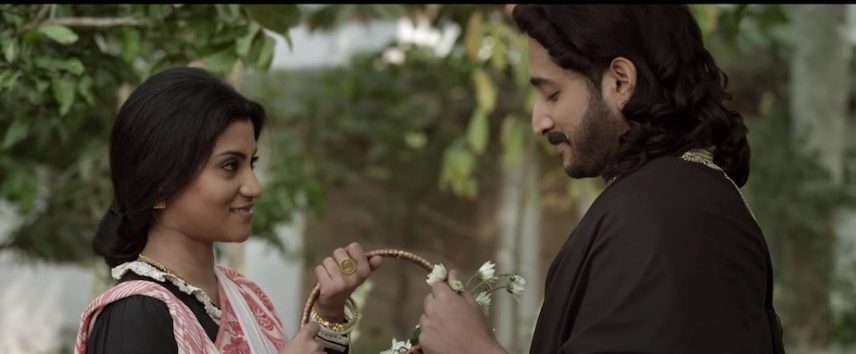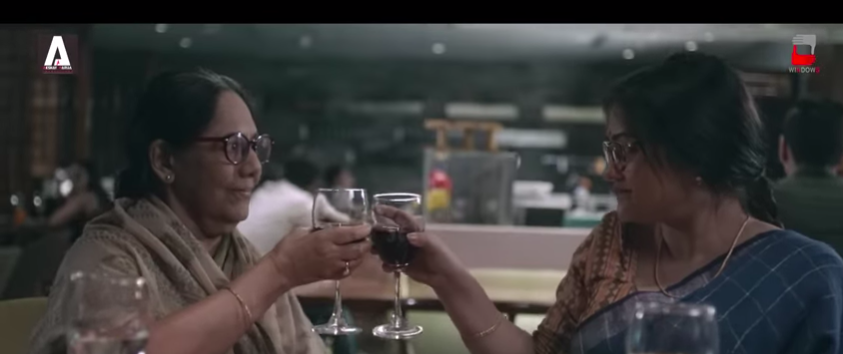Much has been said and written about single mothers, but when it comes to single fathers, there has not been much debates and discussions on it. Being a single father is rather unusual and something rarely heard of. Our society has a common perception that compared to men, women are better equipped by nature to handle the responsibilies of raising children. But things are changing rapidly and the changing social milieu gets reflected in pop-culture too. When I first heard about the Bengali movie "Baba, Baby O...", I made up my mind to watch the movie simply out of curiosity because of the rather unusual topic it dealt with.
Meghroddur (played by Jisshu Sengupta), the protagonist of the movie, is a man in his forties. He is bachelor and when he failed to find the love of his life even after four decades of existence, he decides to enjoy the bliss of fatherhood instead. So he becomes a father of twin babies through surrogacy. Later, he meets his love interest Brishti (played by Solanki Roy) at a toy-store where he goes shopping for toys for his children. Brishti, the owner of the toy-store, is in her 20s and she hates kids. Their rather unusual love-story unfolded in the movie.
According to a study by the University of Toronto done in 2016, of the world's 2-3 billion children, 14% are growing up in a single-parent household. In the US alone, fathers make for 4% of the total single-parent households, shows the US 2015 census report. Though there isn't enough data on the number of single fathers in India, it's not something that is unheard of yet there's not adequate portrayal of single fathers in pop-culture. This is why I find the movie "Baba, Baby O..." rather unique.
I found the whole concept of the movie quite interesting and thought-provoking. I am not a pro at reviewing movies. So I am just going to share the reasons why the movie resonated so strongly with me.
First, the movie is laudable for de-coupling the concepts of marriage and parenthood. In most mainstream, commercial movies, the lead couple fall in love first, followed by marriage and parenthood. But this movie does not follow any such linear narrative. Here the protagonist becomes a "Baba" (father) first. The "O" (the significant other) enters his life much later.
Second, given the fact that the protagonist Megh is a single father, it was kind of expected that he would expect his future wife to be a mother-figure in his children's lives. Here, too, the movie strays from the expected narrative. Brishti is a woman who hates children and is least interested in motherhood. But that doesn't deter Megh from falling in love with her. The movie highlights that marriage is expected to offer companionship only. Nothing more, nothing less. Even if both the partners are not on the same page regarding parenthood, there's nothing wrong in it. This is something I absolutely adored about the movie.
Third, it drives home the point that a parent is a parent, biological or not. To be a good parent, you just need a heart capable of loving unconditionally. There's nothing biological about it. Brishti's mother remarried after her divorce. Her ex-husband, Brishti's biological father, was an absent father who didn't want anything to do with his daughter. On the other hand, Brishti's step-father became successful to be a real father-figure in her life.
Fourth, it debunks the myth that women are natural care-givers. Megh, a man, loves being a father while Brishti, a woman, hates kids. Care-giving has nothing to do with gender and everything to do with individual characteristics.
Overall, I loved the movie for it's rather modern take on marriage and parenthood. At the end of the movie, I had only one niggling doubt in my mind: can the reverse of the situation depicted in the movie ever happen? Would a man in his 20s ever dare to fall in love with a single mother in her 40s? I'll definitely love to watch such a movie.
Acknowledgement: An article on internet about single fathers in India





